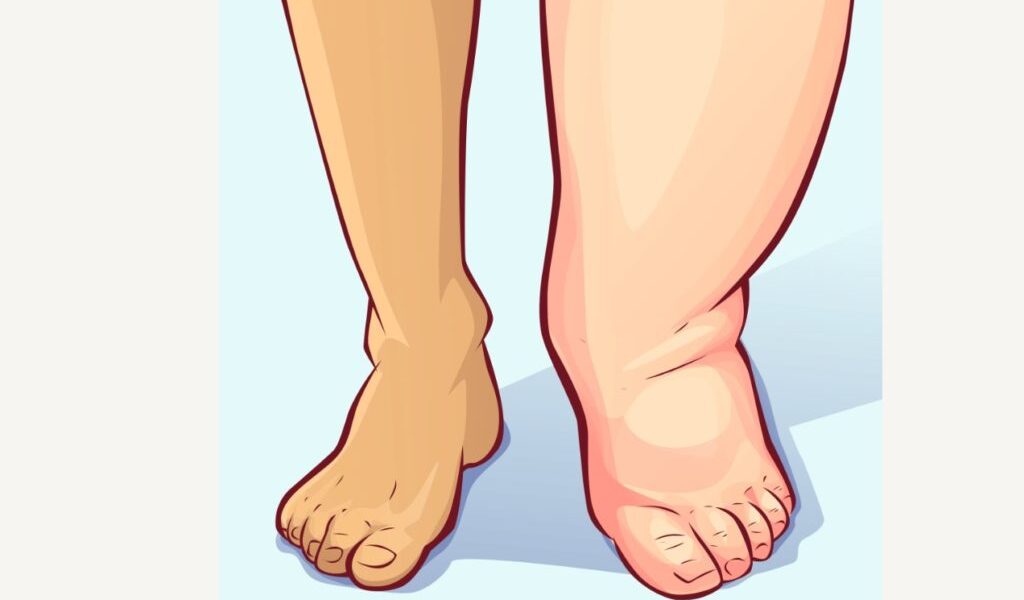Swelling is a condition that occurs when excess fluid accumulates in the body tissues. Swelling can affect any part of the body or the whole body. Swelling can be caused by various factors, such as injury, infection, inflammation, or disease. In this blog post, we will explore some of the most common causes, symptoms, and treatment options for swelling.
What is swelling?
Swelling, also known as edema, is a term that describes the enlargement of organs, skin, or other body parts due to the buildup of fluid in the tissues. The excess fluid can result from leakage of blood vessels, retention of water and salt, or blockage of lymphatic vessels.
Swelling can be classified into two types:
• Localized swelling: This refers to swelling that affects a specific area of the body, such as the ankle, eye, or face. Localized swelling can be caused by trauma, infection, allergy, or inflammation in the affected area.
• Generalized swelling: This refers to swelling that affects large areas of the body or the whole body. Generalized swelling can be caused by systemic conditions that affect the heart, kidney, liver, or blood circulation.
What are the symptoms of swelling?
The main symptom of swelling is the increase in size or shape of the affected body part. Other symptoms may include:
• Tightness or heaviness in the skin or muscles.
• Reduced mobility or range of motion of the joints.
• Discomfort or pain in the enlarged region.
• Pitting or indentation of the skin when pressed.
• Changes in skin color or texture.
• Difficulty breathing or swallowing if the swelling affects the face, neck, or chest.
The severity and duration of swelling may vary depending on the cause and location of the swelling. Some swelling may be mild and temporary while some may be severe and chronic.
What causes swelling?
There are many possible causes of swelling, but some of the most common ones include:
• Injury: Injury can damage the blood vessels and cause them to leak fluid into the surrounding tissues. Injury can result from accidents, falls, sports activities, burns, bites, or surgery.
• Infection: Infection can occur when bacteria, viruses, fungi, or parasites invade the body and cause inflammation and immune response. Infection can affect any part of the body and cause fever, redness, warmth, pus, or abscess.
• Allergy: Allergy is an abnormal immune reaction to substances that are normally harmless. Allergy can cause histamine release and vasodilation (widening of blood vessels) that increase fluid leakage into the tissues. Allergy can be triggered by foods, drugs, insect stings, pollen, dust mites, animal dander, mold spores, latex, or cosmetics.
• Inflammation: Inflammation is the body’s natural response to damage or infection. Inflammation involves increased blood flow and immune activity in the affected area to fight off foreign invaders and promote healing. Inflammation can cause heat, swelling, redness, and pain.
• Medications: Medications can affect the fluid balance or blood pressure in the body and cause swelling. Some medications that can cause swelling include: Antihypertensives (such as calcium channel blockers or beta blockers): These are drugs that lower blood pressure by relaxing or dilating blood vessels. This can result in fluid retention or edema in the lower extremities. Nonsteroidal anti-inflammatory drugs (NSAIDs) (such as ibuprofen or naproxen): These are drugs that reduce pain and inflammation by inhibiting the production of prostaglandins, which are chemical messengers that regulate blood flow, fluid balance, and inflammation. This can result in reduced kidney function or sodium excretion, leading to fluid retention or edema. Corticosteroids (such as prednisone or dexamethasone): These are drugs that suppress immune system activity and reduce inflammation by mimicking the effects of cortisol, which is a natural hormone produced by the adrenal glands. This can result in increased sodium retention, decreased potassium excretion, and increased water retention, leading to fluid retention or edema. Estrogens (such as birth control pills or hormone replacement therapy): These are drugs that contain synthetic forms of estrogen, which is a natural hormone that regulates female reproductive functions. This can result in increased sodium retention, decreased potassium excretion, and increased water retention, leading to fluid retention or edema. Diseases: Diseases are conditions that affect the normal functioning of the body or its organs. Diseases can cause swelling by affecting the heart, kidney, liver, or blood circulation that regulates the fluid balance in the body. Some common diseases that cause swelling include:
Heart failure: This is a condition that occurs when the heart cannot pump enough blood to meet the body’s needs. This can result in fluid backup in the lungs (pulmonary edema) or the legs (peripheral edema). Kidney disease: This is a condition that occurs when the kidneys cannot filter enough waste products or excess fluid from the blood. This can result in fluid buildup in the tissues (edema) or the abdomen (ascites).
Liver disease: This is a condition that occurs when the liver cannot perform its functions properly, such as producing proteins, storing glycogen, or detoxifying substances. This can result in fluid buildup in the abdomen (ascites) or the legs (peripheral edema). Venous insufficiency: This is a condition that occurs when the veins cannot return blood efficiently from the lower extremities to the heart. This can result in increased pressure and fluid leakage into the tissues (edema).
How are swelling diagnosed?
To diagnose swelling, a healthcare provider will usually ask about the history and characteristics of the swelling. They may ask questions such as:
When did the swelling start?
Where is the swelling located?
How severe is the swelling?
What makes the swelling better or worse?
Do you have any other symptoms?
Do you have any medical conditions?
Do you take any medications?
Do you have any allergies?
Have you had any recent exposures to irritants or allergens?
Then, your healthcare provider will perform a physical examination to look for signs of injury, infection, inflammation, or disease in the swollen area. They may also measure your weight, blood pressure, and pulse. Depending on the suspected cause of the swelling, your healthcare provider may order some tests to confirm the diagnosis or rule out other causes. These tests may include:
Blood tests: These are tests that measure levels of blood cells, electrolytes, enzymes, hormones, or other substances that may indicate infection, disease, or organ function.
Urine tests: These are tests that measure levels of chemicals or microorganisms in urine that may indicate infection, disease, or kidney function.
X-rays: These are images that use radiation to show the structure and condition of bones and organs. Ultrasound: These are images that use sound waves to show the structure and function of organs and blood vessels. Computed tomography (CT) scan: These are images that use X-rays and computer technology to show detailed views of organs and tissues. Magnetic resonance imaging (MRI) scan: These are images that use magnets and radio waves to show detailed views of organs and tissues.
How are swelling treated?
The treatment of swelling depends on the cause and severity of the swelling. Some general treatment options include:
Self-care: This involves taking steps to reduce the excess fluid and prevent further complications. Some self-care measures include: Elevating your legs above your heart level when lying down to improve blood flow and reduce fluid accumulation. Wearing compression stockings or bandages to apply pressure on your legs and prevent fluid leakage into your tissues. Reducing salt intake to avoid water retention and lower blood pressure. Drinking plenty of water to flush out toxins and excess sodium from your body. Exercising regularly to improve blood circulation and muscle tone. Avoiding standing or sitting for long periods to prevent blood pooling in your legs. Avoiding alcohol and tobacco to reduce inflammation and improve organ function. Medications: These are drugs that help treat infection, inflammation, allergy, disease, or organ failure that may cause or worsen swelling. Some medications include: Antibiotics to treat bacterial infections. Antifungals to treat fungal infections. Antivirals to treat viral infections. Anti-inflammatories to reduce inflammation and pain. Antihistamines to relieve allergy symptoms such as itching and sneezing. Diuretics to increase urine output and remove excess fluid from your body.



